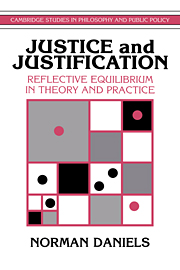Book contents
- Frontmatter
- Contents
- Preface
- 1 Introduction: Reflective equlibrium in theory and practice
- PART I
- 2 Wide reflective equilibrium and theory acceptance in ethics
- 3 Reflective equilibrium and Archimedean points
- 4 On some methods of ethics and linguistics
- 5 Two approaches to theory acceptance in ethics
- 6 An argument about the relativity of justice
- 7 Moral theory and the plasticity of persons
- 8 Reflective equilibrium and justice as political
- PART II
- Index
2 - Wide reflective equilibrium and theory acceptance in ethics
Published online by Cambridge University Press: 01 February 2010
- Frontmatter
- Contents
- Preface
- 1 Introduction: Reflective equlibrium in theory and practice
- PART I
- 2 Wide reflective equilibrium and theory acceptance in ethics
- 3 Reflective equilibrium and Archimedean points
- 4 On some methods of ethics and linguistics
- 5 Two approaches to theory acceptance in ethics
- 6 An argument about the relativity of justice
- 7 Moral theory and the plasticity of persons
- 8 Reflective equilibrium and justice as political
- PART II
- Index
Summary
There is a widely held view that a moral theory consists of a set of moral judgments plus a set of principles that account for or generate them. This two-tiered view of moral theories has helped make the problem of theory acceptance or justification in ethics intractable, unless, that is, one is willing to grant privileged epistemological status to the moral judgments (calling them “intuitions”) or to the moral principles (calling them “self-evident” or otherwise a priori). Neither alternative is attractive. Nor, given this view of moral theory, do we get very far with a simple coherence view of justification. To be sure, appeal to elementary cohence (here, consistency) constraints between principles and judgments sometimes allows us to clarify our moral views or to make progress in moral argument. But there must be more to moral justification of both judgments and principles than such simple coherence considerations, especially in the face of the many plausible bases for rejecting moral judgments; e.g., the judgments may only reflect class or cultural background, self-interest, or historical accident.
I shall argue that a version of what John Rawls has called the method of wide reflective equilibrium reveals a greater complexity in the structure of moral theories than the traditional view. Consequently, it may render theory acceptance in ethics a more tractable problem. If it does, it may permit us to recast and resolve some traditional worries about objectivity in ethics. To make this suggestion at all plausible, I shall have to defend reflective equilibrium against various charges that it is really a disguised form of moral intuitionism and therefore “subjectivist.”
- Type
- Chapter
- Information
- Justice and JustificationReflective Equilibrium in Theory and Practice, pp. 21 - 46Publisher: Cambridge University PressPrint publication year: 1996
- 5
- Cited by

